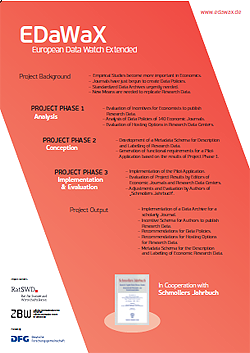Posted: November 29th, 2011 | Author: Sven | Filed under: Projects | Tags: Linking Data and Publications | Comments Off on GESIS: Integration of Research Data and Literature in the Social Sciences
 Today I want to introduce another project of the 27 projects that are funded by the German Research Foundation (DFG) in a call on “Information Infrastructure for Research Data”.
Today I want to introduce another project of the 27 projects that are funded by the German Research Foundation (DFG) in a call on “Information Infrastructure for Research Data”.
This project is InFoLiS (Integration von Forschungsdaten und Literatur in den Sozialwissenschaften / Integration of Research Data and Literature in the Social Sciences) – managed by GESIS, the Leibniz Institute for the Social Sciences.
Intensifying the interconnectedness between digital information systems and their respective data sources is a major issue in the digital era and constitutes an important demand for the supply of scientific information. Missing links between resources require scientists conducting empirical research to manually search full texts of publications for references to the underlying data sources. These references are not cited in a standardized manner. Information about the referenced data sources can only be accessed using separate and structurally distinct information systems. This procedure is not only time consuming, but the inconsistency and sometimes incompleteness of citations may also hamper or even impede data retrieval. Because of this, linking metadata of publications and studies and making them accessible directly via joint information systems constitutes an important task.
GESIS and the Mannheim University Library aim to achieve this objective in the InFoLiS project. Study data administered by GESIS shall be linked to publication data provided by Mannheim University Library in order to extend and professionalize existing information systems. In the course of this project, various methods will be investigated and integrated into the involved systems. On this basis, the project will evaluate and recommend different approaches for data integration and thereby ensure the usability of the results for other universities and institutes engaging in Social Sciences.
Posted: November 21st, 2011 | Author: Sven | Filed under: EDaWaX | Tags: Aims, EDaWaX, Poster | 1 Comment »
 Prof. Klaus Tochtermann, Director of the German National Library of Economics – Leibniz Information Center for Economics, gave a first presentation on the EDaWaX-Project.
Prof. Klaus Tochtermann, Director of the German National Library of Economics – Leibniz Information Center for Economics, gave a first presentation on the EDaWaX-Project.
Mr. Tochtermann gave the poster presentation in the course of the Knowledge Exchange Primary Data Workshop on Monday and Tuesday last week.
Knowledge Exchange is a co-operative effort that supports the use and development of Information and Communications Technologies (ICT) infrastructure for higher education and research.
The Knowledge Exchange partners express a common vision based on four national strategies:
‘To make a layer of scholarly and scientific content openly available on the Internet.’
Read the rest of this entry »
Posted: November 17th, 2011 | Author: Sven | Filed under: Projects | Tags: Data Centers, Data Policies, Knowlegde Exchange | Comments Off on “Surfboard for Riding the Wave” Report: Data availability policies of journals
 Additionally to my blogpost where I introduced the “Surfboard for Riding the Wave” report, I want to point out a single part of the report for this post:
Additionally to my blogpost where I introduced the “Surfboard for Riding the Wave” report, I want to point out a single part of the report for this post:
In Chapter 3.5, data availability policies of journals are discussed – a subject connected to the tasks of the EDaWax work package “Analysis of Data Policies”. Currently the EDaWax-Project is examining over 140 economic journals regarding their data availability policies.
Back to the “Surfboard”-Report: KE stated, that
“most peer-reviewed journals in science, technology and medicine have files where authors can add supplementary data related to the article, such as data sets, multimedia files, large tables, animations, and protocols.”
For example a study found out that the percentage of articles that contained supplementary materials increased from 7% in 2003 to 25% in 2009 – at least for the reviewed 28 high impact medical journals.
Read the rest of this entry »
Posted: November 15th, 2011 | Author: Sven | Filed under: Report | Tags: Knowledge Exchange, Research Data, Vision | 6 Comments »
 Following the report “Riding the Wave: How Europe can gain from the rising tide of scientific data” that was released 2010 by the high level expert group on research data, the Knowledge Exchange (KE) partners have embraced this vision and commissioned a report that translates Riding the Wave into actions for the four partner countries and beyond.
Following the report “Riding the Wave: How Europe can gain from the rising tide of scientific data” that was released 2010 by the high level expert group on research data, the Knowledge Exchange (KE) partners have embraced this vision and commissioned a report that translates Riding the Wave into actions for the four partner countries and beyond.
The report was presented today during a KE workshop in Bonn.
The Report “A Surfboard for Riding the Wave” builds on the 2010 report and presents an overview of the present situation with regard to research data in Denmark, Germany, the Netherlands and the United Kingdom and offers broad outlines for a possible action programme for the four countries in realising the envisaged collaborative data infrastructure.
While the 2010 report of the high level expert group on research data presented a vision for the year 2030, the report of KE concretizes this vision for the four countries.
Read the rest of this entry »
Posted: November 11th, 2011 | Author: Sven | Filed under: Projects | Tags: Guidelines, RDM, Report | Comments Off on #rdtk_herts: First Project Report available
 The first monthly progress report of the project ‘Service Oriented Toolkit for Research Data Management‘ (aka #rdtk_herts) is available on the project website.
The first monthly progress report of the project ‘Service Oriented Toolkit for Research Data Management‘ (aka #rdtk_herts) is available on the project website.
The ‘Service Oriented Toolkit for Research Data Management‘ project, is running at University of Hertfordshire from October 2011 until March 2013.
The site also contains a brief introduction to the Toolkit and an article pointing to University of Hertfordshire’s data management policy, which the Toolkit seeks to enable.
University of Hertfordshire published new policy and guidelines for staff with regard to Data Management on September 1, 2011. Most of the policy and its appendices are available publicly on the University’s Policy and Regulation web site under Data Management Policy.
The most useful part of the policy for Researchers is the appendix: Guide to Research Data Management . This contains a checklist of questions, the answers to which lead to the formation of a good practice Data Management Plan and also facilitate the responses likely to be required by external funding bodies.
The production of further guidance and demonstration of commoditised services is one of the purposes of the Research Data Toolkit project, thereby helping researchers to ‘tick off’ their checklist, create successful bids, and establish and cement good data management.
The project team welcomes feedback and information from members of the Research Data Management community!
Posted: November 8th, 2011 | Author: Sven | Filed under: Data Sharing, Research Data | Tags: Data Sharing, Open Data | 1 Comment »
 Martin Hall, Vice-Chancellor of the University of Salford, addresses in his blogpost some interesting questions and positions related to open data:
Martin Hall, Vice-Chancellor of the University of Salford, addresses in his blogpost some interesting questions and positions related to open data:
First he states that access to and use of data may be shaped as much by social conventions as by available technology.
He quotes a report published by NESTA and RIN to illustrate what he means:
“Cultures vary in different disciplines, which can itself cause difficulties in cross-disciplinary work; but researchers are typically both co-operative and competitive. The key currency for securing competitive career rewards is publication of articles, conference papers and monographs; and many researchers regard the data and other resources that they create in the course of their research as their intellectual capital which they wish to exploit and mine in order to produce new publications over an extended period. Some researchers fear that openness involves a loss of control, and a risk of being scooped by others”.
Read the rest of this entry »
Posted: November 3rd, 2011 | Author: Sven | Filed under: Data Sharing | Tags: barriers, Data Sharing, incentives | Comments Off on Data Publishing: arguably a good thing-but there isn’t that much of it. Why?

“If the data and related metadata collected for impact evaluations was more readily discoverable, searchable, and made available, the world would be a better place. “
With this global statement Markus Goldstein, a researcher of the World Bank, started his blogpost about a better access to impact evaluation data. For Goldstein, the advantages to access this kind of data are overwhelming:
“It would be easier to replicate studies and, in the process, to expand them by for example: trying other outcome indicators; checking robustness; and looking for heterogeneity effects (e.g. gender). There is also a wealth of other things one could do with the related metadata, including: looking at how different wording of survey questions generates different answers and getting parameters for power calculations. Last but not least, making these data available would allow for a wide range of non-impact evaluation research.”
<br>
As reasons why researchers -despite all these great advantages- do not share their data, Goldstein states mainly three major concerns:
- The first is that researchers need some return on their investment – they spend a lot of time developing the instruments, negotiating the entire set up of both the survey and the evaluation, acquiring money and so on.
- The second reason: making data available is a painfull job he claims, because a lot of variables have to be documented – and all this in a somewhat friendly format. The whole issue get’s even more painfull, if some part of the data considers confidential information, because this takes even more careful attention.
- Third, there are no rewards or incentives in the economics profession as a whole for bearing this cost or pain.
Posted: November 2nd, 2011 | Author: Sven | Filed under: fraud | Tags: fraud, investigation, manipulation, Netherlands, Research Data | Comments Off on Nature Magazine: Massive Fraud at Dutch Universities
 The nature magazine reported that the famous Dutch psychologist Diederik Stapel had manipulated research data for years.
The nature magazine reported that the famous Dutch psychologist Diederik Stapel had manipulated research data for years.
A Report [in Dutch] claimed that the prominent researcher of Tilburg University fabricated some of his eye-catching studies on social behaviour.
Actually at least 30 papers in peer-reviewed journals are in the focus of a committee that investigates the work of the researcher.
The report says that Stapel often came up with a hypothesis and then designed an experiment to test it. Stapel took responsibility for collecting data and a few weeks later he produced a fictitious data file. In other cases Stapel received co-authorship after producing data he claimed to have collected previously that surprisingly exactly matched the needs of a colleague working on a study.
The data themselves were also curios the report mentioned: effects were large; missing data and outliers were rare; and hypotheses were rarely refuted.
Journals publishing Stapel’s papers did not question the omission of details about where the data came from.
In September Stapel was suspended from his position at Tilburg University – three young researchers had found irregulartities within his published data. An investigation followed – containing further papers and occupations in other universities, where Stapel worked prior to Tilburg University.
This is just another example that reflects the needs of publishing articels with their related research data. A task that is important for the quality of research as well as for the quality of scholarly journals.
Photo: ‘Fraud Key‘ by GotCredit on flickr.com. License: CC-BY-2.0
 Today I want to introduce another project of the 27 projects that are funded by the German Research Foundation (DFG) in a call on “Information Infrastructure for Research Data”.
Today I want to introduce another project of the 27 projects that are funded by the German Research Foundation (DFG) in a call on “Information Infrastructure for Research Data”.

 Additionally to my
Additionally to my 
 The first monthly progress report of the project ‘Service Oriented Toolkit for Research Data Management‘ (aka #rdtk_herts) is available on the
The first monthly progress report of the project ‘Service Oriented Toolkit for Research Data Management‘ (aka #rdtk_herts) is available on the








